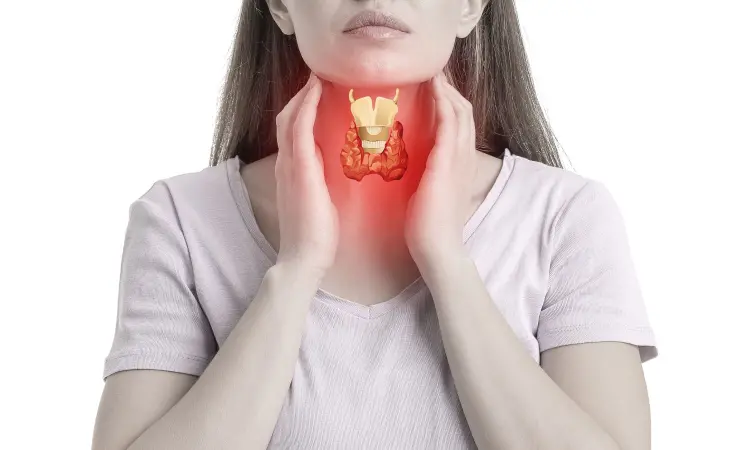- Home
- Medical news & Guidelines
- Anesthesiology
- Cardiology and CTVS
- Critical Care
- Dentistry
- Dermatology
- Diabetes and Endocrinology
- ENT
- Gastroenterology
- Medicine
- Nephrology
- Neurology
- Obstretics-Gynaecology
- Oncology
- Ophthalmology
- Orthopaedics
- Pediatrics-Neonatology
- Psychiatry
- Pulmonology
- Radiology
- Surgery
- Urology
- Laboratory Medicine
- Diet
- Nursing
- Paramedical
- Physiotherapy
- Health news
- Fact Check
- Bone Health Fact Check
- Brain Health Fact Check
- Cancer Related Fact Check
- Child Care Fact Check
- Dental and oral health fact check
- Diabetes and metabolic health fact check
- Diet and Nutrition Fact Check
- Eye and ENT Care Fact Check
- Fitness fact check
- Gut health fact check
- Heart health fact check
- Kidney health fact check
- Medical education fact check
- Men's health fact check
- Respiratory fact check
- Skin and hair care fact check
- Vaccine and Immunization fact check
- Women's health fact check
- AYUSH
- State News
- Andaman and Nicobar Islands
- Andhra Pradesh
- Arunachal Pradesh
- Assam
- Bihar
- Chandigarh
- Chattisgarh
- Dadra and Nagar Haveli
- Daman and Diu
- Delhi
- Goa
- Gujarat
- Haryana
- Himachal Pradesh
- Jammu & Kashmir
- Jharkhand
- Karnataka
- Kerala
- Ladakh
- Lakshadweep
- Madhya Pradesh
- Maharashtra
- Manipur
- Meghalaya
- Mizoram
- Nagaland
- Odisha
- Puducherry
- Punjab
- Rajasthan
- Sikkim
- Tamil Nadu
- Telangana
- Tripura
- Uttar Pradesh
- Uttrakhand
- West Bengal
- Medical Education
- Industry
Palopegteriparatide Demonstrates Sustained 3-Year Efficacy in Hypoparathyroidism in Phase 3 trial

Researchers have found in a 3-year phase 3 trial that palopegteriparatide (TransCon PTH) showed sustained improvements in biochemical markers, kidney function, and quality of life in adults with hypoparathyroidism. Already FDA-approved based on earlier trial data, the extended results confirm long-term therapeutic benefits.
Results were shared over the weekend in an oral presentation by Aliya Khan, M.D., Clinical Professor of Medicine, Division of Endocrinology and Geriatrics and Director of the Calcium Disorders Clinic at McMaster University (Canada) at ENDO 2025, the annual meeting of the Endocrine Society being held in San Francisco.
PaTHway was a Phase 3, randomized, double-blind, placebo-controlled 26-week trial of 82 adults with chronic hypoparathyroidism, followed by an open-label extension period through Week 182. During the initial 26-week blinded period, participants were randomized 3:1 TransCon PTH:placebo. Renal function was assessed by estimated glomerular filtration rate (eGFR). Safety assessments included 24-hour urine-calcium and treatment-emergent adverse events (TEAEs). Hypoparathyroidism-related symptoms, functioning, and well-being were measured by the Hypoparathyroidism Patient Experience Scale (HPES). Overall retention in the trial was high, with 73 of the original 82 adults enrolled (89%) completing the 3.5-year trial.
At Week 156, 64 patients (88%) had normal albumin-adjusted serum calcium levels and 70 patients (96%) were independent from conventional therapy (defined as taking < 600 mg/day of calcium and not taking active vitamin D). Reflecting clinically meaningful improvements in kidney function, improvements in eGFR from baseline were sustained through Week 156: mean eGFR increased by 8.76 mL/min/1.73 m2 across all participants and by 13.98 mL/min/1.73 m2 in participants with baseline eGFR < 60. Patients in the trial reported continued improvements from baseline in their hypoparathyroidism-related symptoms and health-related quality of life and showed continued normalization of 24-hour urine calcium excretion through Week 156. In the trial, TransCon PTH treatment was generally well-tolerated, with no new safety signals identified. TEAEs were mostly mild or moderate and no serious TEAEs or discontinuations were related to study drug.
“We are pleased to report these latest data from our second clinical trial of TransCon PTH showing sustained efficacy and improvements across key health and quality of life measures, beginning at the earliest timepoints in the Phase 3 PaTHway trial and continuing through three years of treatment,” said Aimee Shu, M.D. Executive Vice President of Endocrine & Rare Disease Medical Science and Chief Medical Officer at Ascendis Pharma. “These responses, including normalization of skeletal dynamics with significant and clinically meaningful improvements in kidney function, demonstrate the long-term benefits of this treatment option for the vast majority of adults with hypoparathyroidism, regardless of their disease etiology.”
About Hypoparathyroidism
Hypoparathyroidism is an endocrine disease caused by insufficient levels of parathyroid hormone (PTH), the primary regulator of calcium and phosphate balance in the body, acting directly on bone and kidney and indirectly on the intestine. Individuals with hypoparathyroidism may experience a range of severe and potentially life-threatening short-term and long-term complications, including neuromuscular irritability, renal complications, extra-skeletal calcifications, and cognitive impairment. Post-surgical hypoparathyroidism accounts for the majority of cases (70-80%), while other etiologies include autoimmune and idiopathic causes.
Dr Kamal Kant Kohli-MBBS, DTCD- a chest specialist with more than 30 years of practice and a flair for writing clinical articles, Dr Kamal Kant Kohli joined Medical Dialogues as a Chief Editor of Medical News. Besides writing articles, as an editor, he proofreads and verifies all the medical content published on Medical Dialogues including those coming from journals, studies,medical conferences,guidelines etc. Email: drkohli@medicaldialogues.in. Contact no. 011-43720751


